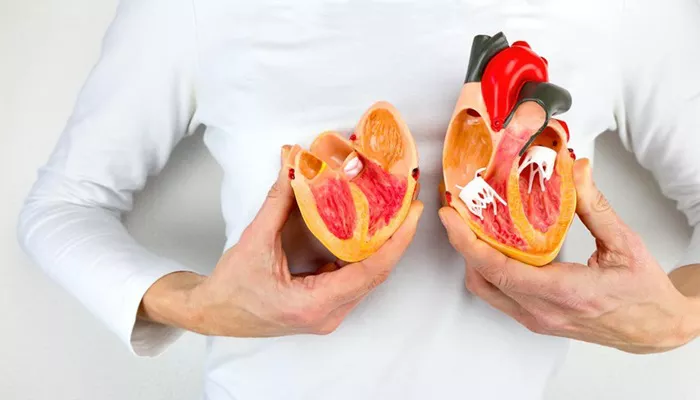Arrhythmia, a condition characterized by irregular heartbeats, can vary significantly in severity and impact. Some arrhythmias are benign and asymptomatic, while others can be life-threatening and require immediate intervention.
Understanding the root cause and the specific type of arrhythmia is crucial in determining the appropriate treatment approach.
Types of Arrhythmias
There are several types of arrhythmias, each with its own causes and treatments:
Atrial Fibrillation (AFib): A common type of arrhythmia characterized by rapid and irregular beating of the atria.
Bradycardia: A slower than normal heart rate.
Tachycardia: A faster than normal heart rate.
Ventricular Fibrillation: A severe arrhythmia that requires immediate medical attention.
Premature Ventricular Contractions (PVCs): Extra heartbeats originating in the ventricles.
see also: What Antibiotic Can Cause Arrhythmia?
Diagnosing Arrhythmia
To cure arrhythmia permanently, accurate diagnosis is essential.
Diagnostic tools include:
Electrocardiogram (ECG or EKG): Measures the electrical activity of the heart.
Holter Monitor: A portable device worn for 24-48 hours to record heart activity.
Event Monitor: Similar to a Holter monitor but used for longer periods to capture sporadic arrhythmias.
Echocardiogram: Uses ultrasound waves to create images of the heart.
Stress Test: Assesses how the heart performs under physical stress.
Electrophysiological Testing (EP Study): Involves threading catheters through blood vessels to the heart to map electrical signals.
Treatment Options
There are several treatment options for arrhythmia, ranging from lifestyle changes and medication to invasive procedures.
Here are the primary methods:
1. Lifestyle Changes
Adopting a heart-healthy lifestyle is crucial for managing and potentially curing arrhythmia:
Diet: A diet rich in fruits, vegetables, whole grains, and lean proteins can help maintain heart health. Reducing sodium, caffeine, and alcohol intake can also be beneficial.
Exercise: Regular physical activity can strengthen the heart and improve cardiovascular health. However, it’s essential to consult a doctor before starting an exercise regimen, especially for those with severe arrhythmias.
Weight Management: Maintaining a healthy weight can reduce the risk of arrhythmia and other heart-related conditions.
Stress Management: Techniques such as meditation, yoga, and deep-breathing exercises can help reduce stress and its impact on the heart.
2. Medications
Medications can be used to control heart rate, rhythm, and other underlying conditions contributing to arrhythmia:
Antiarrhythmic Drugs: Medications such as amiodarone, flecainide, and sotalol help maintain a regular heartbeat.
Beta Blockers: Medications like metoprolol and atenolol reduce heart rate and blood pressure.
Calcium Channel Blockers: Drugs like verapamil and diltiazem help relax blood vessels and reduce heart rate.
Anticoagulants: Blood thinners such as warfarin and newer agents like dabigatran help prevent blood clots, reducing the risk of stroke in patients with AFib.
3. Medical Procedures
When lifestyle changes and medications are insufficient, medical procedures may be necessary:
Cardioversion: An electrical shock is delivered to the heart to restore a normal rhythm, often used for AFib.
Catheter Ablation: A minimally invasive procedure where catheters are used to destroy areas of heart tissue causing arrhythmia. It is highly effective for many types of arrhythmias.
Pacemaker: A small device implanted under the skin that helps regulate the heartbeat. It is used for bradycardia and other slow arrhythmias.
Implantable Cardioverter-Defibrillator (ICD): A device that monitors heart rhythms and delivers shocks if dangerous rhythms are detected, used for life-threatening arrhythmias.
Surgical Ablation: For severe cases, a surgeon may perform an ablation during open-heart surgery, often combined with other heart surgeries like valve repair.
4. Advanced Therapies
Research continues to advance the treatment of arrhythmias, and some patients may benefit from newer therapies:
Gene Therapy: Research is ongoing into using gene therapy to treat certain types of arrhythmias by targeting specific genetic mutations.
Stem Cell Therapy: Investigating the use of stem cells to repair damaged heart tissue and restore normal heart function.
Wearable Technology: New technologies, including wearable devices, can monitor heart rhythms continuously and provide early warnings of arrhythmias.
Permanent Cure
While many arrhythmias can be managed effectively, the term “permanent cure” is complex. For some patients, especially those with structural heart disease or genetic predispositions, complete eradication of arrhythmia may not be possible.
However, for others, particularly those with certain types of arrhythmias like AV nodal reentrant tachycardia (AVNRT) or atrial flutter, catheter ablation can offer a high chance of a permanent cure.
Holistic Approach
A holistic approach to treating arrhythmia involves combining multiple strategies tailored to the individual patient:
Comprehensive Evaluation: A thorough evaluation by a cardiologist specializing in electrophysiology is crucial.
Personalized Treatment Plan: A treatment plan that considers the type of arrhythmia, underlying conditions, patient’s lifestyle, and preferences.
Regular Follow-Up: Continuous monitoring and follow-up are essential to adjust treatments as needed and ensure long-term success.
Conclusion
Curing arrhythmia permanently requires a multifaceted approach involving lifestyle changes, medications, medical procedures, and sometimes advanced therapies. Early diagnosis and personalized treatment plans are key to effectively managing and potentially curing arrhythmia. While not all arrhythmias can be completely eradicated, many patients can achieve significant improvements in their condition and quality of life with the right treatment strategy.

